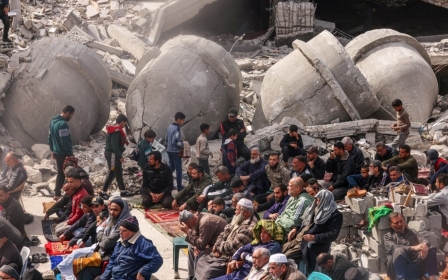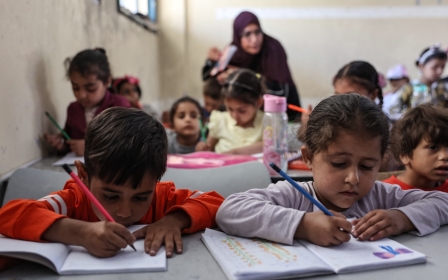Rocks, looting, protests: How Israelis are blocking Gaza-bound aid trucks

Far-right Israeli groups have taken extreme measures in recent day to block the passage of aid trucks bound for the besieged Gaza Strip.
On Thursday, demonstrators cut off a road near the town of Mitzpe Ramon by forming a sit-in and scattering large rocks and stones across the road to prevent aid trucks and other vehicles from passing.
“Do you find it reasonable that the state of Israel will deliver medicine, food, and fuel to terrorists who are at this very moment torturing our daughters?” one of the demonstrators said.
Drone footage showed a long line of aid trucks effectively brought to a standstill along a winding narrow mountain pathway due to the protest.
The protesters say that aid is helping Hamas, and believe that it should be blocked from entering Gaza until all Israeli captives taken to the enclave during the 7 October attack on southern Israel are freed.
Stay informed with MEE's newsletters
Sign up to get the latest alerts, insights and analysis, starting with Turkey Unpacked
The UN says the entire 2.3 million population of Gaza is facing high levels of acute food insecurity due to Israeli siege and attacks, and is in need of aid.
Earlier in the week, six Israelis were arrested as protesters blocked and attacked aid trucks heading from Jordan to Gaza.
Activists from far-right group Tzav 9 prevented trucks from passing at various roads along the trucks’ route on Monday night.
At the Latrun junction near Jerusalem, roads were blocked for several hours until Israeli police moved in to disperse the protesters. Police said several trucks and their contents were damaged.
Israeli public broadcaster Kan reported that protesters punctured the tyres of one truck. On another truck, demonstrators threw aid - including food - on to the road.
“Dozens of protesters began to disturb the peace when they blocked humanitarian aid trucks travelling towards the Gaza Strip in accordance with the decision of the Israeli government,” Israeli police said in a statement.
“Some of them caused damage to the trucks travelling on these roads and their contents.”
A video posted on social media showed Israelis dumping bags of flour from an aid truck onto the road.
Days earlier, Tzav 9 organised a protest at the King Hussein Bridge (Allenby) crossing between Jordan and the occupied West Bank.
Protesters sat in front of trucks, holding up Israeli flags and pictures of captives held in Gaza.
Jordan said the aid convoys were attacked by “extremist Israeli settlers”, condemning the action “in the strongest terms”.
“The ministry considered the failure of the Israeli government to protect the two aid convoys, and allowing them to be attacked, as a brutal violation of its legal obligations, as the occupying power and of its obligations to allow aid to enter Gaza,” Jordan’s foreign ministry said last week.
Crossings closed
Israel closed the Karem Abu Salem (Kerem Shalom) crossing along the boundary between Gaza, Israel and Egypt, on Sunday following a deadly Hamas rocket attack on a nearby military site that killed four Israeli soldiers and wounded 10 others.
The Rafah crossing, the only route in and out of Gaza not controlled by Israel, was captured by Israeli forces on Tuesday.
Palestinian officials at the crossing have said that passenger entries and aid deliveries have since stopped due to the Israeli ground invasion of the area.
Israeli authorities said they re-opened the Beit Hanoun (Erez) crossing in northern Gaza last month, allowing limited non-fuel supplies to enter the enclave. The crossing, which is mostly used for foot traffic rather than goods, was closed in October after it was destroyed during Hamas's attack.
"Erez will simply not be enough," said James Elder, spokesperson for the UN children's agency, on Tuesday. "If Rafah gate closes for an extended period, it's hard to see how famine in Gaza can be averted."
In the genocide case against Israel, the International Court of Justice in January issued a provisional ruling ordering the country to enable the entry of urgent humanitarian aid into Gaza.
But well before the capture of the Rafah crossing this week, Israel had already been found to be defying the order by directly bombing aid convoys and impeding aid deliveries through delays, denials of entry and protests.
Israelis from across the political spectrum have been gathering at Karem Abu Salem to stop the delivery of humanitarian aid since January.
Many had set up tents in the area, and blocked aid entries by lying across the ground in front of trucks. Israeli authorities subsequently declared the area a military zone, in order to clear protesters.
In just one day, on 6 February, the protesters blocked the delivery of 130 aid trucks entering Gaza.
Middle East Eye delivers independent and unrivalled coverage and analysis of the Middle East, North Africa and beyond. To learn more about republishing this content and the associated fees, please fill out this form. More about MEE can be found here.





